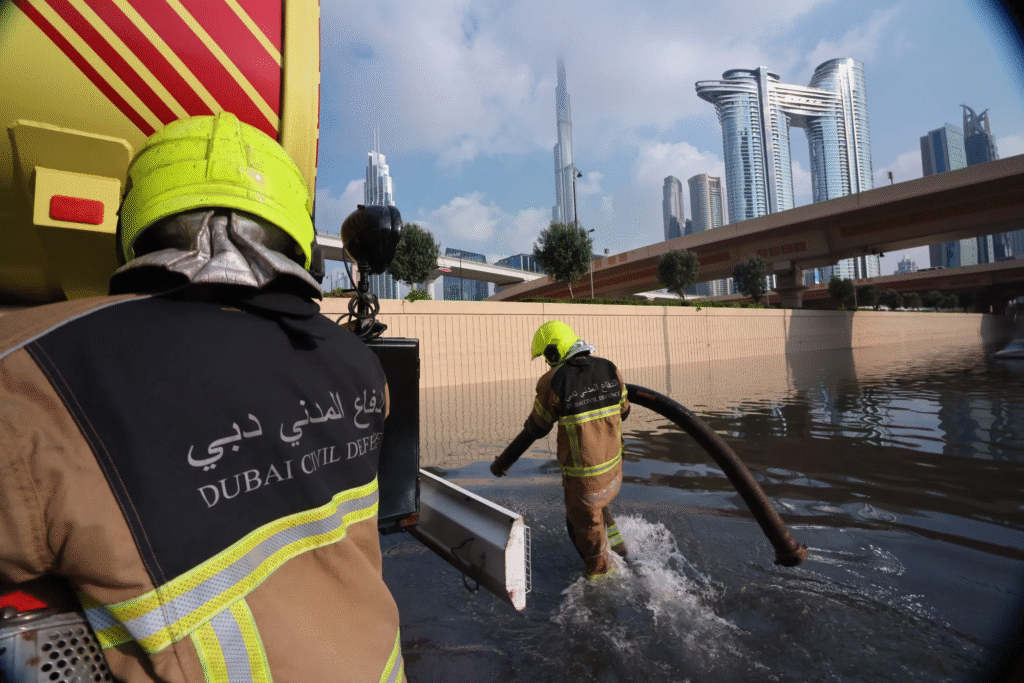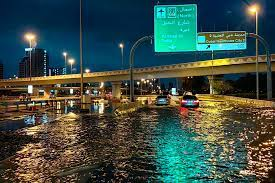
Dubai, famous for its sunshine and desert climate, witnessed an unexpected weather event last week as heavy rains swept across the city. This rare and sudden downpour caused widespread disruption, including waterlogging on main roads, flooded homes, delayed flights, and interrupted public services. In response, Dubai’s emergency services moved swiftly and decisively to protect residents, clear roads, and restore normalcy.
This report covers how the government, rescue teams, and citizens worked together to face this weather surprise.

Dubai is known for its dry, arid conditions and rare rain showers. However, the recent storm caught the city by surprise. Within hours, many areas reported rainfall that exceeded the city’s usual monthly average. Streets in key neighborhoods like Deira, Bur Dubai, and Jumeirah turned into water streams. Social media was flooded with videos of cars stuck in water, pedestrians wading knee-deep, and homes dealing with leakage and dampness.
Flights at Dubai International Airport were delayed as visibility dropped and runways became slippery. Schools and offices sent people home early to avoid the worst of the storm.
Dubai’s emergency response teams acted fast. Within minutes of the first warnings, police, Civil Defence, and Dubai Municipality teams were seen on the streets directing traffic, pumping out water, and helping stranded motorists.
Dubai Police quickly set up roadblocks in flooded areas and diverted traffic to safer routes. They also issued public warnings through radio, SMS, and social media, asking residents to stay indoors unless absolutely necessary. Patrol cars were seen assisting drivers whose vehicles were trapped in water.
Civil Defence teams responded to calls from residential buildings and shops facing water seepage or electrical risks. Emergency pumping equipment was used to clear water from underground parking lots and basements in many apartment towers.
Colonel Ali Al Mutawa, spokesperson for Dubai Civil Defence, said, “Our teams worked round the clock to attend to over 300 emergency calls in just 24 hours. No serious injuries were reported thanks to public cooperation and timely response.”
Dubai Municipality deployed dozens of trucks and vacuum machines to remove water from the streets. Workers manually cleared blocked drains and stormwater openings to prevent further accumulation.
Eng. Mariam Al Muhairi, Director of the Drainage Network Department, shared that “over 500 field workers were sent across the city to manage flooded zones and clear the drainage network. This helped restore traffic movement on Sheikh Zayed Road and other major highways by evening.”
Emergency shelters were opened at several government buildings to house people whose homes became unsafe due to waterlogging or electrical hazards. Food and water were provided to affected families. Volunteers from community groups and charities also stepped forward to help distribute dry clothes and basic supplies.
RTA (Roads and Transport Authority) issued real-time updates for commuters on Metro and bus services. Some Metro stations experienced minor flooding but were cleaned and reopened quickly. Taxi services were also increased to support stranded passengers.
The National Centre of Meteorology (NCM) had issued warnings about possible heavy rain and thunderstorms two days earlier, but the intensity surprised many residents. Authorities have now promised to review drainage capacities and rainwater management systems in the city.
Experts are also calling for better public awareness about how to handle such sudden storms—especially in using caution when driving, avoiding low-lying areas, and safeguarding homes against rainwater entry.
Social media in the UAE was buzzing with posts, photos, and videos of the rain. Many expressed shock at the rare weather, while others praised the fast emergency response.
One user tweeted: “Never seen Dubai like this! Roads flooded but police helping everywhere. Thanks to our heroes in uniform.”
Others posted safety tips, asking residents to avoid basements or underground parking during such weather events.

The Dubai rainstorm has reminded everyone that even in the most modern cities, nature can surprise at any moment. The swift work of emergency teams, government agencies, and citizens prevented a serious disaster.
In a press conference, Dubai officials confirmed that no lives were lost and essential services resumed quickly. Plans are now in place to further improve the city’s rainwater management systems, especially as weather patterns across the region grow less predictable due to climate change.
Dubai’s emergency response during the heavy rainstorm is a strong example of urban disaster management. Thanks to quick action and public cooperation, the city avoided major harm and quickly returned to normal. Yet, the incident has sparked fresh discussions on how the city can prepare even better for such rare but powerful weather events in the future.
Residents are now more aware of safety procedures, and the government has promised improvements in rain handling systems—making Dubai even stronger against nature’s surprises.
Read More:- Portugal’s Dama Art Gallery Takes Global Lead in Art Movement Now 2025
